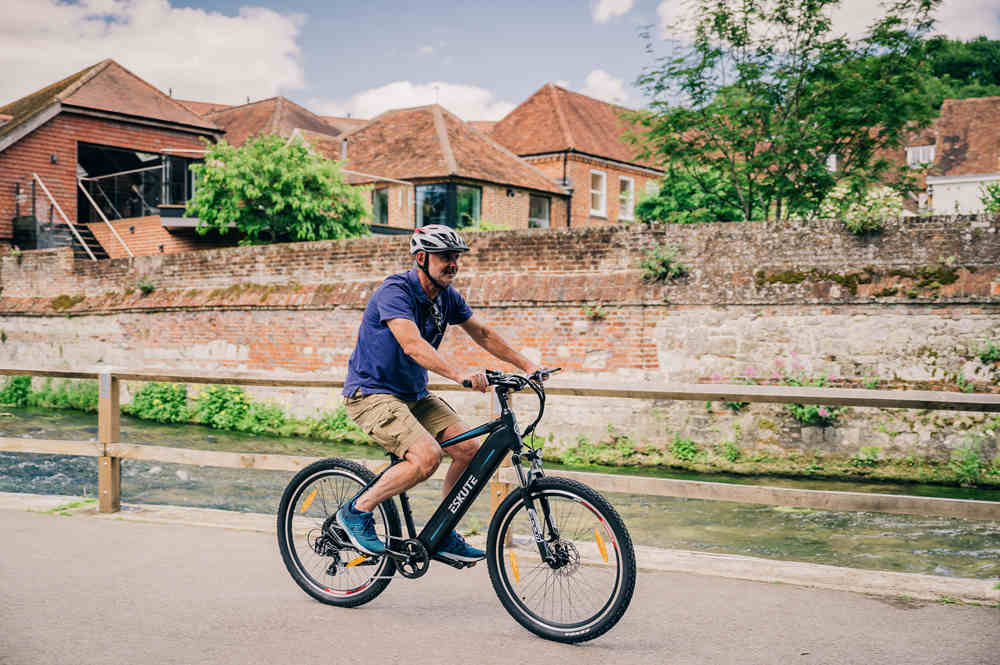Navigation
In recent years, electric bikes, or e-bikes, have soared in popularity, offering a convenient and eco-friendly transportation option attractive to various demographics, including senior citizens. But what about their safety for older riders? Are they truly a suitable option? We'll delve into the world of e-bikes, exploring their safety features and the numerous health benefits they can offer to senior riders.

Understanding E-Bikes
Before we dive into the safety aspects, let's take a closer look at what e-bikes are and how they function. Essentially, an e-bike is a regular bicycle equipped with a small motor and a battery. It's designed to provide an extra boost when you pedal. If you've mastered riding a conventional bicycle, transitioning to an e-bike will be a breeze.
Safe for Seniors
E-bikes have been intentionally designed with older riders in mind. They are a safe and enjoyable mode of transportation for seniors, provided that certain precautions are taken into consideration. The enhanced stability and ease of use make e-bikes a great choice for those who may have concerns about traditional cycling.
Health Benefits
E-bikes offer more than just convenience; they provide a range of health benefits for senior riders. While pedalling an e-bike, riders engage in low-impact physical exercise that is gentle on joints and muscles. Studies have consistently shown that this type of exercise has a positive impact on physical well-being.

One key advantage of e-bikes is that they make cycling more accessible to seniors. The motor assistance reduces the perceived effort required to pedal, making it a more enjoyable experience. As a result, many seniors find themselves motivated to engage in exercise more frequently, reaping the rewards of improved cardiovascular health, muscle strength, and balance.
Choosing the Right E-Bike
- When considering an e-bike for a senior rider, it's essential to select the right model. Some e-bikes are better suited for older individuals due to their design and safety features, while others may not be as ideal. Consider factors such as ease of getting on and off, stability, and ergonomic design.
- Electric bikes, or e-bikes, come in a wide range of styles and designs, catering to various needs and preferences. They offer an excellent alternative to traditional bikes, providing power assistance that can be especially beneficial for seniors. However, before seniors invest in an e-bike, several important factors should be taken into account.
- Selecting the right e-bike involves evaluating different aspects such as design, weight, motor power, tires, and suspension. It's essential to find a model that aligns with your physical abilities and intended use.
Consider Your Physical Limitations
One of the primary factors to consider when purchasing an e-bike for seniors is your physical condition. It's essential to think about any physical limitations you might have that could affect your cycling experience. For instance, some seniors may have difficulty swinging their legs over a high bike frame or reaching the ground when seated.

To address these concerns, consider e-bike designs like step-thru e-bikes and electric cruisers. Step-thru frames create a low centre of gravity, improving stability, balance, and ease of mounting and dismounting. Cruiser bikes, with their broad tires, wide seats, and tall handlebars, provide a comfortable and stable riding experience, making them ideal for older riders.
Weight of the Bike
E-bikes are generally heavier than traditional bicycles due to the added components like batteries and motors. While weight is a factor to consider, it shouldn't be the sole determinant in your decision. E-bikes are designed to offset their weight with powerful motors, making them manageable, even when riding uphill.
Motor Size and Power
The size and power of the e-bike's motor are essential considerations. E-bikes typically use hub motors in budget-friendly models, which offer comparable power to mid-drive motors but often have higher wattage ratings. Your choice should depend on your intended use and budget.
Tires
Certain e-bikes are equipped with fat tires, which can add weight but provide stability, especially during intense pedalling or on uneven terrain. Consider your typical riding conditions when choosing a tire type.
Adjustable Suspension Forks
E-bikes often come with adjustable suspension forks, which are valuable for seniors seeking a comfortable ride on rough roads. These forks absorb shocks, enhancing the overall riding experience.
E-bikes are a fantastic option for seniors looking to maintain an active and enjoyable cycling experience. When choosing an e-bike, consider your physical limitations, bike weight, motor power, tire type, and suspension options. Finding an e-bike that aligns with your specific needs and preferences will ensure a safe and satisfying ride, opening up new opportunities for exploration and physical activity.
Exploring the Pros and Cons of E-Bikes for Seniors
E-bikes, or electric bicycles, have gained popularity in recent years for their potential benefits to seniors. They offer a unique mode of transportation that combines convenience and exercise. Let's delve into the advantages and disadvantages of e-bikes for elderly riders.

Advantages
Enhanced Safety
E-bikes are a safer alternative to traditional bikes and even cars. Studies show that e-bike accidents decreased significantly in recent years. Their slower speeds and regenerative braking systems contribute to this safety.
Healthier Lifestyle
Regular e-bike use can contribute to healthier living. It aids in preventing diseases like diabetes, cardiovascular issues, and obesity. Research indicates that routine exercise reduces the risk of chronic illnesses, promoting overall well-being.
Improved Mental Health
Physical activity stimulates the brain, increasing oxygen flow and cognitive function. E-biking can boost dopamine levels, a neurotransmitter associated with mood and motivation, potentially enhancing mental health.
Tailored Selection
A wide range of e-bike options is available for older riders. You can find models designed for maintaining fitness in urban environments or those with larger battery capacities for longer journeys.
No Mandatory Pedaling
Many e-bikes come with electric boosters or accelerators, allowing riders to travel without constant pedalling. This feature is especially helpful for tackling challenging terrains or providing rest for tired legs.
Disadvantages
Assembly Challenges
E-bikes often require some assembly, including attaching wheels, handlebars, and pedals. This process can be challenging for those with limited physical strength or stature. Some might opt for professional assembly services, incurring extra costs.
Injury Risk
E-bikes are heavier and more powerful than traditional bicycles, which can pose an injury risk, particularly for seniors. It's crucial to be cautious and observe safety measures, such as wearing helmets and being mindful of speed, especially when going downhill.
Weight and Size
E-bikes tend to be larger and heavier than regular bicycles. Their weight can range from 45 to 70 pounds, largely due to the extra load from the motor and battery, depending on the model.
In conclusion, e-bikes offer seniors a safer and healthier mode of transportation. They come with advantages such as enhanced safety, health benefits, and various options for different needs. However, there are assembly challenges, potential injury risks, and considerations related to their size and weight. Seniors should carefully evaluate these factors to make an informed decision regarding e-bike usage.










1 comment
Brian Sadler
Why can’t I find the T300 Trike Electric Bike for sale on your UK Website as I wanted to order one with a spare Battery I found it on the American website and thought it would come up on the British website so I ordered it but it shows it in American money and I would have to pay duty for it to be sent to the United Kingdom can you please help thanks Brian Sadler
Leave a comment
This site is protected by hCaptcha and the hCaptcha Privacy Policy and Terms of Service apply.